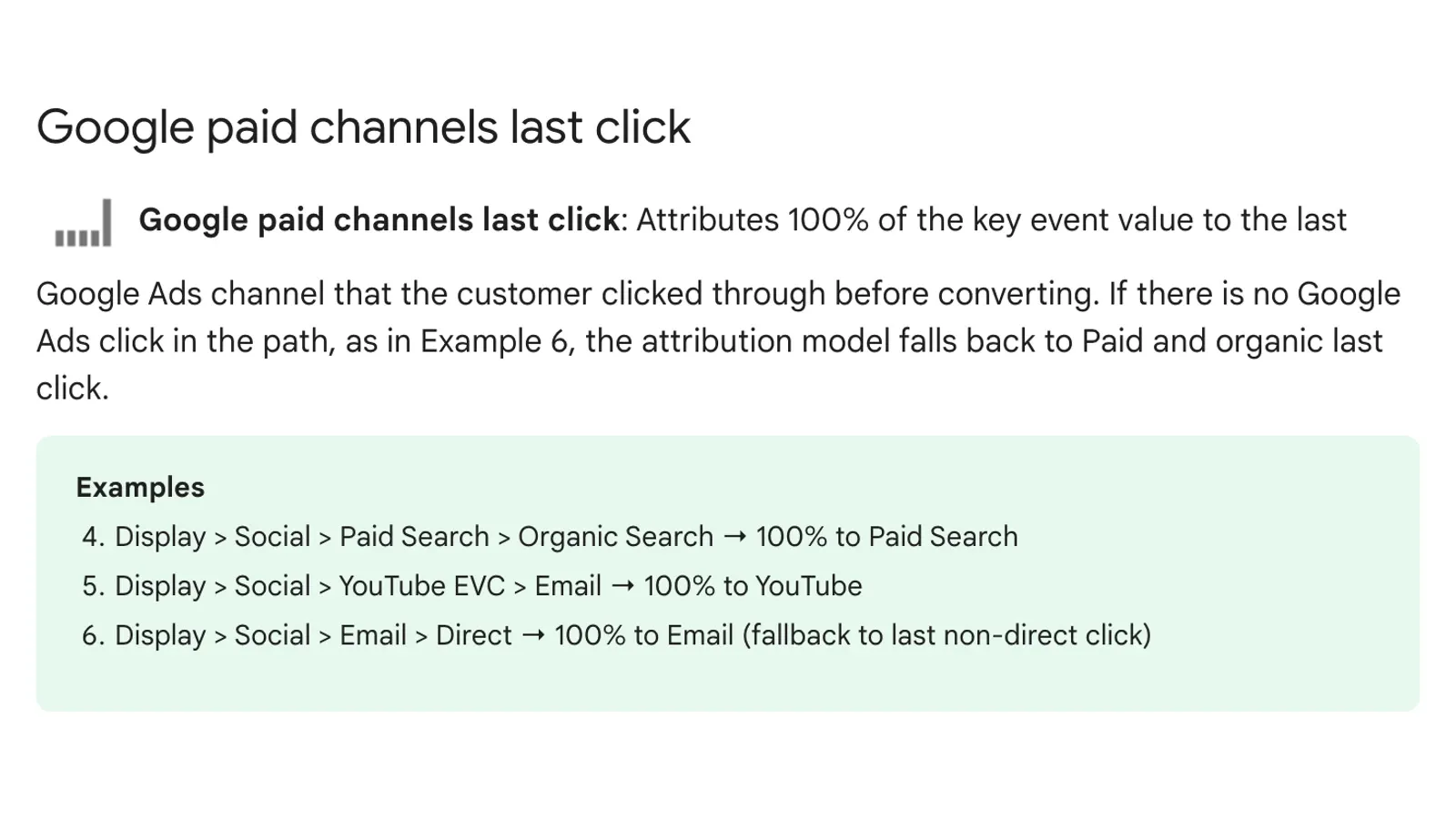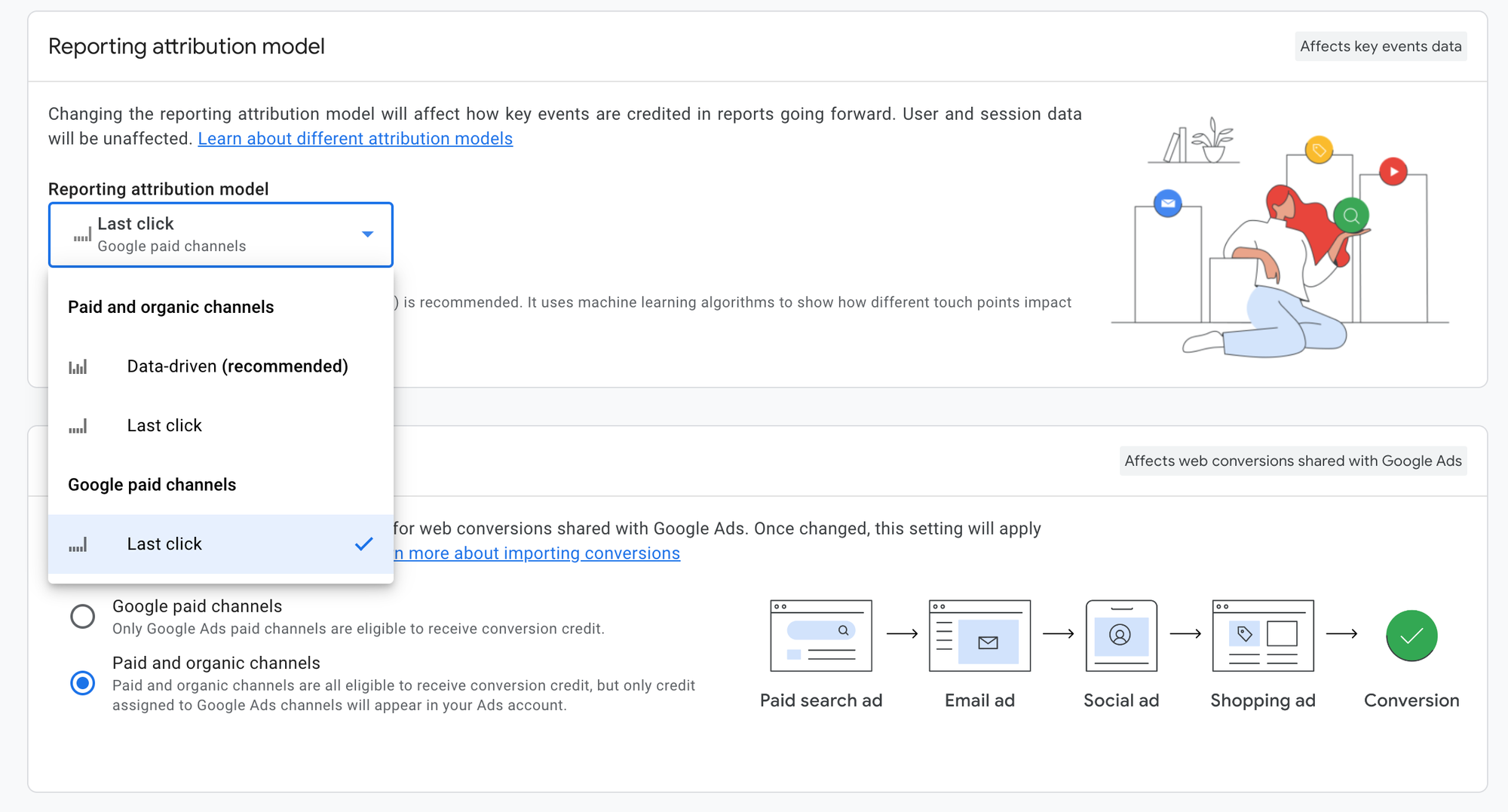The controversial Google Paid Channels Last Click reporting attribution model
Long questioned the "Google paid channels last click" model, which attributes 100% of the conversion value to the last Google Ads channel a customer interacted with before converting.

A recent social media post by Chris Long sparked a conversation about Google Analytics attribution models. Long questioned the "Google paid channels last click" model, which attributes 100% of the conversion value to the last Google Ads channel a customer interacted with before converting.
This raises important considerations for marketers when evaluating campaign performance and allocating budget effectively.
Am I the only one that thinks this is ridiculous?
— Chris Long (@gofishchris) May 10, 2024
Google literally has an attribution model where you can credit 100% of the conversion back to Google Ads...no matter what. pic.twitter.com/cJgDWvCPoy
The Importance of attribution models in marketing
Attribution models are crucial in digital marketing as they determine how credit is assigned for customer conversions. These models help marketers understand which touchpoints within a customer journey (e.g., social media ad, website visit, email) played a role in driving a conversion (e.g., purchase, sign-up).
Google Analytics 3 attribution models that allow marketers to customize credit distribution based on their marketing goals and customer journey:
These actions, previously called conversions, are now referred to as "key events" in GA4. Here's a breakdown of the three attribution models available in GA4:
1. Data-driven Attribution
This is the most advanced model and leverages machine learning to analyze user behavior across both converting and non-converting paths. It considers factors like time from the key event, device type, number of ad interactions, the order of ad exposure, and creative assets. This allows the model to attribute credit to touchpoints that are most likely to have driven the key event.
Key benefits:
- Most accurate reflection of the customer journey
- Considers the impact of all touchpoints, not just the last click
Limitations:
- Requires a significant amount of data for optimal performance
- May not be suitable for all businesses, especially those with limited data
2. Paid and Organic Last Click
This is a simpler model that assigns 100% of the credit for a key event to the last channel a user interacted with before converting (e.g., last ad clicked, organic search). It ignores direct traffic unless the entire user journey consisted only of direct visits.
When to use it:
- Useful for understanding the immediate impact of marketing channels
- Simpler to interpret compared to data-driven attribution
Drawbacks:
- May overestimate the impact of the last touchpoint
- Doesn't account for the influence of earlier interactions
3. Google Paid Channels Last Click
This model is a variation of the "Paid and Organic Last Click" model, but it specifically focuses on Google Ads interactions. Here, 100% of the credit goes to the last Google Ads channel a user clicked on before converting. If there are no Google Ads clicks, it defaults to the "Paid and Organic Last Click" model.
When to use it:
- Valuable for analyzing the performance of Google Ads campaigns in isolation
Limitations:
- Similar drawbacks to "Paid and Organic Last Click" - overestimates the role of Google Ads and ignores other channels
Important Notes:
GA4 no longer offers previously available models like first click, linear, time decay, and position-based attribution.
Direct visits are generally excluded from receiving attribution credit unless the entire path to the key event involves only direct visits.

Choosing to the right attribution model
The best attribution model depends on your marketing goals, customer journey complexity, and data availability. Here are some factors to consider:
- Goals: Are you focused on understanding the overall impact of marketing efforts (data-driven) or the immediate influence of specific channels (last click)?
- Customer Journey: How many touchpoints are typically involved in your customer journey? Complex journeys may benefit from data-driven attribution.
- Data Availability: Data-driven attribution requires a significant amount of data to function effectively.
By understanding these attribution models and their limitations, marketers can gain a more accurate picture of how their marketing efforts contribute to key events. This allows for data-driven decisions to optimize marketing spend and drive better results.
Google Paid Channels Last Click: A Specific Case
The "Google paid channels last click" model is a variation of the last-click model that applies specifically to Google Ads interactions. In this model, if a customer interacts with multiple Google Ads channels (e.g., display ad, search ad) before converting, 100% of the conversion value is attributed to the last Google Ads channel clicked. If there are no Google Ads interactions in the customer journey, the model defaults to the "Paid and organic last click" model, giving credit to the last non-direct channel interaction.
Criticisms of the Google Paid Channels Last Click Model
Marketers like Chris Long have criticized the "Google paid channels last click" model for potentially overvaluing the role of Google Ads in the customer journey. This model might not account for the influence of other marketing channels (e.g., social media, email marketing) that may have played a significant role in driving conversions.
Understanding attribution models and their limitations is crucial for marketers to effectively evaluate campaign performance and optimize strategies. The "Google paid channels last click" model, while potentially overvaluing Google Ads, offers a specific way to analyze Google Ads campaign data. Marketers should be aware of its limitations and choose the attribution model that best suits their specific marketing goals and customer journey.

